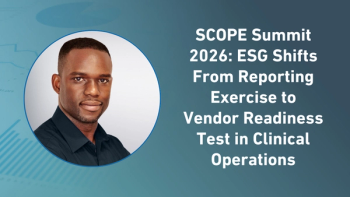
Update on Maintaining TMF Quality
A discussion of various topics amongst TMF experts from Questex’s 2020 Global TMF Summit.
Trial Master File (TMF) quality has been a topic of increasing popularity amongst clinical quality professionals, as many regulatory inspections and audits focus on the TMF to uncover clues on clinical trial sponsor oversight behaviors. There was much discussion on various topics amongst TMF experts at Questex’s
TMF KDRs
(Key Document Reviews) (Please note the below presentation with Steph Viscomi was a Co-Presentation with Anusha Rameshbabu, Trial Master File (TMF) Process Specialist, Alexion Pharmaceuticals)
Stephanie Viscomi, Associate Director of TMF Operations at Alexion, discussed the importance of sustaining TMF quality oversight through KDRs. Viscomi emphasized that proper TMF oversight includes the ability to demonstrate appropriate monitoring document submission timeliness, the presence of tools that capture action items and verifying their completion, showing sufficient documentation for follow-ups to ensure a quality TMF, and executing quality oversight procedures over third-party vendors managing TMFs. Viscomi described that the purpose of a KDR is to “provide a high-level overview of completeness of a study TMF at any point for a given study. The KDR is a review which can be utilized to review the CRO and/or sponsor files.” In general, study teams should prepare a list of essential TMF documents established as an industry standard and categorized by study, country and site levels, and study life cycle (i.e., study startup, conduct, and closeout). Viscomi explained that the KDR is performed through generating a report of only the key documents from the eTMF system and is organized by study sites and countries. Missing documents should be identified and noted in the reports, and the reports must exhibit the historical context of document changes. Once the report is finalized, a reviewer (typically, a study team member) is assigned, and selects a percentage of documents to determine if they are appropriately filed, and generates comments on documents that are missing information, missing documents, or if there are issues with the quality of the documents. Conducting this process demonstrates to auditors and regulators that a sponsor is showing proper TMF oversight.
Best practices for TMF inspections
Marie-Christine Poisson-Carvajal, Head of TMF Operations at Pfizer, outlined procedures for preparing for a TMF inspection, specifically, generating a toolkit, understanding the scope and format of the inspection and evaluating risk areas, and training study team members on communicating with inspectors and conducting mock inspections with study teams. Poisson-Carvajal indicated that tools and references must include a structured inspection folder, TMF storyboard template, and inspector training master slide deck and roster, an audit trail deck, a TMF access management plan, and a library of regulatory references. Other tools include logistical and technological checklists to ensure a smooth inspection. Poisson-Carvajal then elaborated on the inspection scope, which includes understanding the inspection scope and agenda, familiarizing the study team with regulatory agency expectations, assessing TMF health, and deciding on remediation strategies before inspections. Lastly, Poisson-Carvajal emphasized that communication training and practice are critical to ensure a smooth inspection. This includes engaging with the inspection team, technical teams, and study teams to establish familiarity with all involved parties and confirming expectations, conducting mock interviews, and training personnel on the dos and don’ts of inspections, such as being factual and transparent, using data, asking inspectors to clarify questions, limiting answers only to the inspector’s questions, and not providing additional information outside of the scope of the inspection’s agenda.
How to ensure a healthy TMF
Loriann Verna, Director of Quality and Compliance at Just in Time GCP, suggested that TMF analytics alone do not fully delineate TMF health. Verna explained that the TMF is “the collection of essential documents, which allows the conduct of a clinical trial to be reconstructed and evaluated,” and TMF health is multi-faceted, including the quantity of documents, completeness of the TMF, quality of documents and metadata, and timeliness of uploads. For example, study teams cannot evaluate TMF health based only on analytics, such as all documents being uploaded with no known problems or an eTMF system with fulfilled placeholders; TMF reviews and evaluations must be conducted regularly to ensure TMF health. Proper TMF health involves a holistic approach, such as evaluating TMF SOPs, ensuring processes are established, such as business rules and TMF plans and maps, and verifying proper training of all personnel involved. Regular checkups should include checks for document quality and metadata accuracy, regularly scheduled completeness reviews including document cross-checks to verify a clear and complete story. Treatments for unhealthy TMFs include identifying issues, understanding the root cause for these issues, and treating the root causes to prevent future problems from recurring.
Summary
To summarize, regulatory inspections and audits are honing in their efforts on TMF quality, as the quality of the TMF provides insight on sponsor oversight practices, which could open the door to additional inspections if poor sponsor oversight is affirmed through these inspections. By employing various quality control measures to ensure TMF inspection readiness, sponsors can demonstrate proper oversight and avoid adverse findings during inspections.
Moe Alsumidaie, MBA, MSF, is a thought leader and expert in the application of business analytics toward clinical trials, and Editorial Advisory Board member for and regular contributor to Applied Clinical Trials.
Newsletter
Stay current in clinical research with Applied Clinical Trials, providing expert insights, regulatory updates, and practical strategies for successful clinical trial design and execution.




